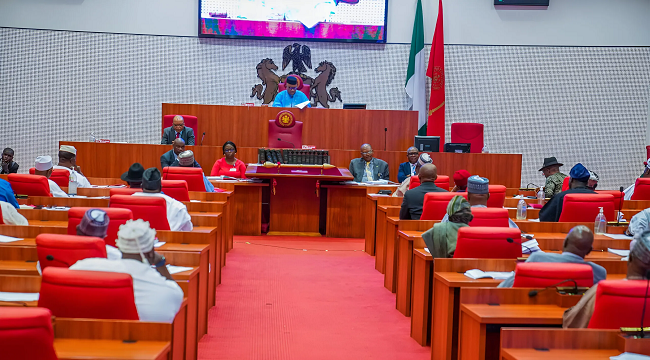
The Nigerian Senate has passed the 2024–2026 Medium-Term Expenditure Framework (MTEF) and Fiscal Strategy Paper (FSP), paving the way for its implementation by the Federal Government.
The decision followed the presentation of a detailed report by Senator Mohammed Sani Musa, Chairman of the Joint Committees on Finance and National Planning & Economic Affairs.
In addition, the Senate directed its Committees on Finance, Petroleum, and Gas to investigate allegations against the Nigerian National Petroleum Company Limited (NNPCL) regarding NGN 8.48 trillion in withheld petrol subsidies and $2 billion (NGN 3.6 trillion) in unpaid taxes. The allegations were highlighted in reports from the Nigeria Extractive Industries Transparency Initiative (NEITI) and the Revenue Mobilization, Allocation, and Fiscal Responsibility Commission.
According to the Office of the Auditor-General of the Federation, full documentation has been received to verify the N2.7 trillion fuel subsidy claims made by NNPCL against the government.
The Senate also approved an exchange rate projection of NGN 1,400 to $1 for 2025–2027, with a provision for review in early 2025. Excess revenue from exchange rate variances is to be allocated to debt servicing.
Senator Adeola Olamilekan, Chairman of the Senate Committee on Appropriations, highlighted the potential impact of the Federal Government’s Compressed Natural Gas (CNG) initiative, stating:
“With the functioning of our refineries, demand for foreign exchange will drop. The CNG initiative will provide affordable alternatives for Nigerians.”
Other key resolutions included inflation rate projections of 15.75%, 14.21%, and 10.04% for 2025, 2026, and 2027, respectively. The proposed Federal Government budget for 2025 stands at NGN 47.9 trillion, with capital expenditure projected at NGN 16.48 trillion and new borrowings at NGN 9.22 trillion.
The Senate urged a reduction in petrol prices, citing the planned commencement of operations at the Port Harcourt Refinery. Senator Yahaya Abdullahi emphasized the need to support the manufacturing sector to ensure the projections of the MTEF are met.








